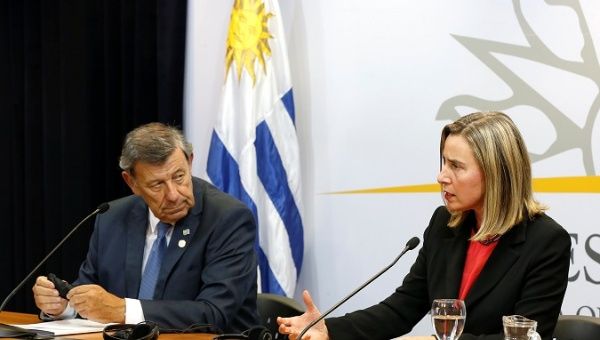
Federica Mogherini, High Representative of the Union for Foreign Affairs and Security Policy and Uruguayan Foreign Minister Rodolfo Nin Novoa speak at a news conference in Montevideo.
MONTEVIDEO, Feb 8 (NNN-TELESUR) — As European and Latin American leaders met on Thursday to seek a peaceful and political solution to Venezuela’s situation, the final declaration of the International Contact Group was eventually not adopted by all the countries attending the international conference, with Bolivia, Mexico and Caricom declining to sign the EU-backed agreement calling for elections in Venezuela “as soon as possible”.
According to the Uruguayan Foreign Minister, Rodolfo Nin Novoa, Bolivia, Mexico and the member states of the Community of the Caribbeans (Caricom), have not signed the text, which suggested new elections, the coordination of a humanitarian and a technical mission on Venezuelan territory.
During the meeting, the European Union-backed International Contact Group on Venezuela called for a more hands-off approach than that advocated by the United States and some of their Latin American conservative allies.
The conference was convened by the governments of Mexico and Uruguay which decided to adopt a neutral and non-interventionist position before other countries in the region that recognized the self-proclaimed Juan Guaido as “interim president,” an act that violated the Venezuelan constitution.
The objectives of the final declaration of Thursday’s International Contact Group were different from the Montevideo Mechanism proposed by the foreign ministers of Uruguay and Mexico a day earlier in which four phases were established to achieve dialogue in Venezuela between the parties involved.
– First phase: An immediate dialogue and the generation of necessary conditions to achieve contact between the parties involved in the conflict.
– Second phase: Negotiation, presentation of the results of the dialogue and a space for the of positions that allow for finding points in common between the parties.
– Third phase: Commitment and subscription of the agreements.
– Fourth phase: Implementation and realization of the agreements with the support of international accompaniment.
The European Union’s foreign policy chief, Federica Mogherini, said the Contact Group was pushing for a peaceful and political solution to the crisis, adding that a resolution must ultimately come from the people of Venezuela.
However the resolution, in fact, called for elections as soon as possible and for humanitarian aid to be delivered to Venezuela without consulting the government of Maduro, actions that infringe on the sovereignty of Venezuela.
Mogherini made it clear that following the meetings on Thursday, two initiatives have been established, one that is the Mechanism of Montevideo which is endorsed and supported by Bolivia, Uruguay, Caricom and Mexico, and another that is EU-led, aka the International Contact Group which is supported by Ecuador, Costa Rica, Uruguay, and several European countries including Italy.
The representatives of Mexico and Bolivia stressed that the declaration of the International Contact Group (IGC) poses interference points in the internal affairs of Venezuela since it intends to impose actions that are not within its competence.
Bolivian Foreign Minister Diego Pary asserted that his government did not endorse the declaration because “we can not accompany a text that refers to the conduct of elections (…) this is an internal issue of Venezuela and they are the ones they must define their difficulties and in what way they will solve them.”
He also urged countries that have carried out illegal sanctions against Venezuela, including the EU itself, to lift them, since he considers that “the blockade against Venezuela is what is affecting the economy” of the nation.
For his part, President of Venezuela Nicolas Maduro spoke in favor of the Montevideo Mechanism, which proposes four phases for dialogue. This was agreed at the meeting on Wednesday, February 6, between 14 CARICOM countries, Mexico, Bolivia and Uruguay.
The United States and its right-wing allies in Latin America have come out in support of a right-wing coup attempt against the Venezuelan government of socialist President Maduro after they supported a decision by opposition lawmaker, named Juan Guaido, to declare himself an “interim president” of Venezuela on Jan. 23 in violation of the country’s constitution.
In return, Maduro has repeatedly called for the restoration of talks between his government and the opposition in order to maintain peace and avoid a U.S.-backed coup, or even military intervention by the United States in favor of removing him and placing an unelected right-wing government. — NNN-TELESUR





